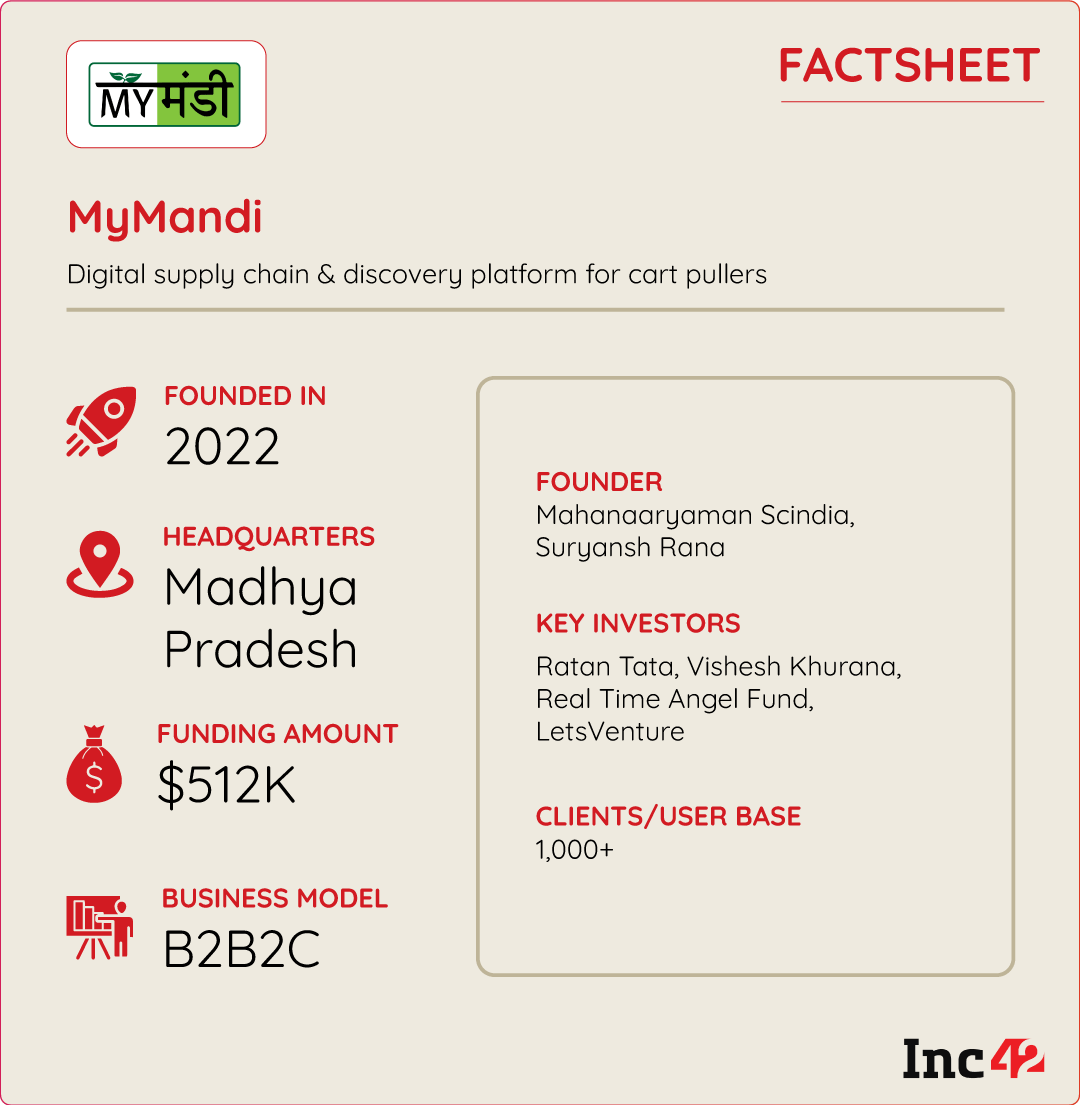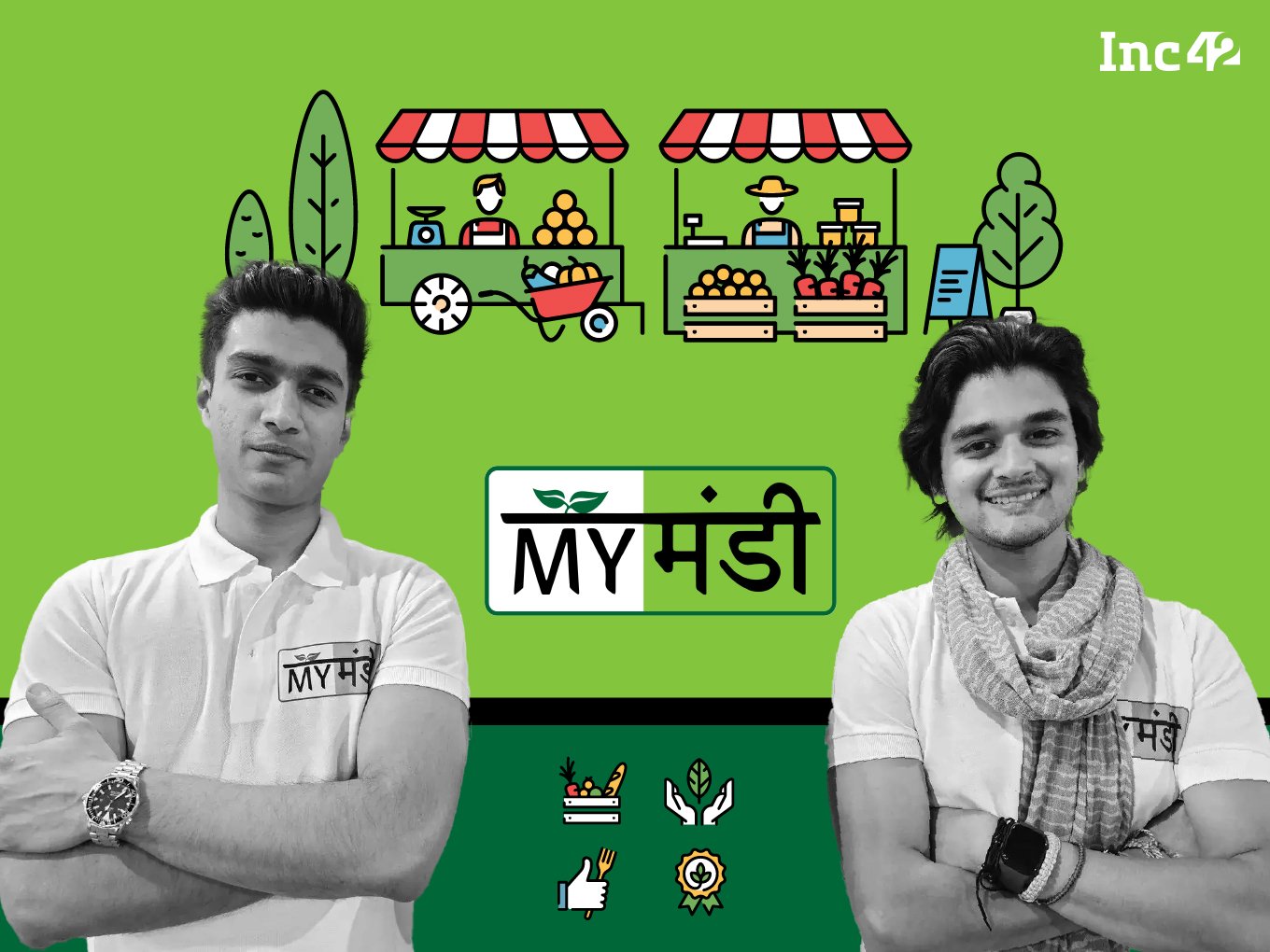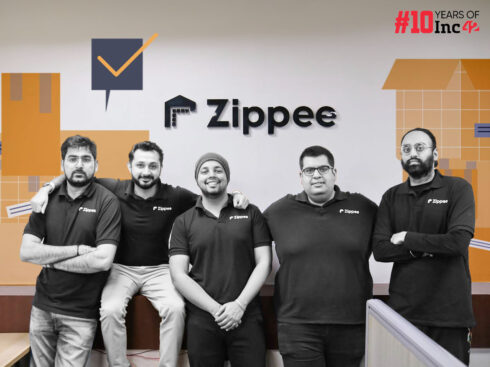SUMMARY
Founded in 2022 by Mahanaryaman Scindia and Suryansh Rana, MyMandi is a B2B2C platform that enables cart pushers to procure fresh produce from its app, delivered directly to their doorstep
Started as a quick commerce startup, the founders realised early on that the model of their startup would do little to transform the lives of fruit and vegetable sellers
The startup has gone from making INR 10 Lakh in revenue in January to INR 70 Lakh in March
Taking inspiration from Amul, which spearheaded India’s white revolution in 1970 and the world’s largest dairy development programme, the prince of Gwalior, Mahanaryaman Scindia and UCLA alumnus Suryansh Rana aspire to be the torchbearers of another such revolution.
However, this time, they are planning to transform the lives of thousands of marginalised cart pushers selling fruits and vegetables.
The duo have been working together for the last three years to bring sustainable changes in the lives of cart pullers, who earn their livelihood by selling fruits and vegetables on streets and surviving on razor-thin margins.
Their aspiration took a formal shape with the inception of MyMandi, a B2B2C marketplace that provides an online platform and other value-added services for the cart-pusher community, in 2022.
Earlier started as a quick commerce platform, the founders realised early on that the model would do little to serve their aspirations to transform the lives of fruit and vegetable sellers.
“We came back to the drawing board and realised that there was a need to empower this community to sell more, better and more efficiently,” Scindia said.
Fast forward to today, MyMandi claims to be working with more than 1,000 digitally empowered street vendors and boasts of saving their time, efforts and money via its platform. Further, the startup gives street vendors a cushion against their procurement woes by cutting middlemen from the entire supply chain.
Well, this is just the tip of the iceberg when it comes to transforming the country’s one of most unorganised markets and empowering the ones who are at the bottom of the retail pyramid. MyMandi’s larger mission is to transform the entire street vendor value chain across the country.

How MyMandi Is Working At The Grassroots
To get a comprehensive understanding of how cart-pushers function, the duo started spending considerable time at local wholesale fruit and vegetable markets, visiting as early as 3 am.
It was then that the scion of the royal family, for the first time, learnt about the plight of cart-pushers, who start their day at around 2 am, combating 15-25 suppliers and at least three middlemen just to buy a day’s worth of inventory (INR 3,000-INR 5,000), which is then sold on streets before the light of the day dims.
Middlemen eating into their already razor-thin margins, a race against time to sell the produce while it is still fresh, and a lot of procurement effort, just to count a few, are some of the many challenges that cart-pushers have to endure daily to bring bread to the table.
To address their procurement woes, the cofounders have developed an app that could reduce their efforts by half by delivering fresh produce to their doorstep maximum by 6 am every day, allowing them to start their day at a reasonable time without much hassle.
“We deliver the fresh produce at the point of sale so that cart-pushers do not have to go to the market. This also allows the street vendors to reduce the amount of wastage as we bring high-quality produce to their doorsteps,” said Scindia, who is also the CEO of MyMandi.
To avail of the service, street vendors use the MyMandi app, which is available in Hindi, and order the products they want. The street vendors pay for the fresh produce directly on delivery to reduce complications throughout the process.
Talking about the business model, the founders said the secret sauce is the startup’s sustainable margins and proven economies of scale. The startup buys the farm produce in bulk from farmers and wholesalers, allowing it to secure significant margins.
Explaining how the startup creates economies of scale, Rana said that around 95% of fresh produce sold in Tier-2 cities and beyond happens via street vendors, which helps them unlock significant margins.
“According to our estimates, there are about 5,000-8,000 vendors in a Tier-2 city,” said Rana, adding that they are now on an expansion spree.
The startup has expanded its footprint into four states – Madhya Pradesh, Uttar Pradesh, Maharashtra and Rajasthan. Scindia claimed that the startup has gone from making INR 10 Lakh in revenue in January to INR 70 Lakh in March 2023.
“We follow a demand-based model and forecast the demand and purchase only the inventory a city requires on any given day. This is how we keep our CAPEX low and don’t need any cold storage or specialised storage materials to store our inventory,” Scindia said.
Empowering The Vendors On Streets
The startup’s aggregation plans are intended to enable street vendors to compete with big companies in the fresh fruits and vegetables space, which have little presence in India’s Tier-2 cities and beyond.
“All the big companies try to capture the market for themselves. But the entire agro space is too large for a single company to dominate,” Rana said, adding that the best way is to aggregate this market via digital means.
Additionally, the cofounders of MyMandi are hell-bent on improving the income of street vendors by passing down the margins, which otherwise are missing in the traditional structure.
According to the cofounders, street vendors using their doorstep delivery service can save up to INR 15,000 per month.
This figure is based on the fact that vendors spend between INR 500 and INR 800 a day, including entry fees and delivery charges and other transportation costs, by relying on wholesale markets for their purchases.
The business model draws close parallels to how Amul sources milk. As Amul sources from small farmers and dairies across the towns and villages of Gujarat, MyMandi sources from small farmers and wholesalers from the cities it operates in.
With further plans to go into contract farming for high-volume products such as onions, potatoes and tomatoes, MyMandi looks set to emulate – to an extent – what Amul has been doing for the production of milk and milk products.
The Future Is Ripe
MyMandi is planning to develop a larger ecosystem of value-added services for street vendors by leveraging a B2C front that allows end users to discover the street vendors holding the MyMandi banner in their local areas.
While the B2C app is still in its developmental phase, MyMandi’s founders see it as a step towards digitising the street vendor market.
Additionally, the startup is looking to partner with companies to offer financial products like health insurance and microcredit to street vendors.
The startup is also exploring the possibility of providing MyMandi-branded electric vehicles to street vendors, enabling them to sell and commute more efficiently.
“The vision is to elevate street vendors to mobile kirana stores from just vegetable sellers. We also want to empower them to sell household and FMCG products,” Scindia aspired.
However, MyMandi has a long way to go, especially when digital literacy in a country like India is still trying to gain pace. To address the challenge, the startup has kept in-app technicalities to a bare minimum and developed the app in Hindi to enhance its adoption.
According to the cofounders, their ultimate goal, however, is to aggregate a massively fragmented segment by leveraging the true potential of some ‘20 Lakh fruit and vegetable cart pushers’ in the country and become the Amul of the fresh fruit and vegetable market in India.
While what MyMandi is doing with street vendors is unique, there have been similar attempts to aggregate a part of India’s retail economy elsewhere. For instance, several Dukaan tech startups have been trying to aggregate kirana stores in India.
A like-for-like comparison in that segment would be LOCOFF, which has developed a discovery platform that allows local stores to take their stores online and receive orders.
As the duo double down on aggregating the street vendors of India, it will be interesting to see how MyMandi enables these street folks to take on the giants of the industry.


























